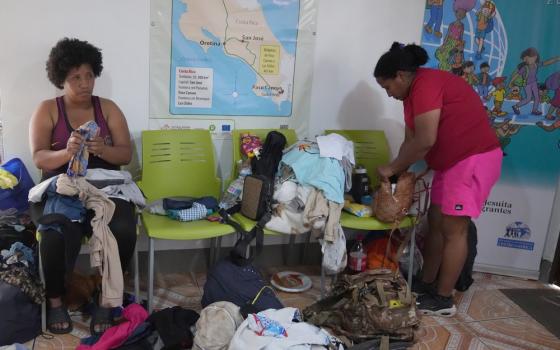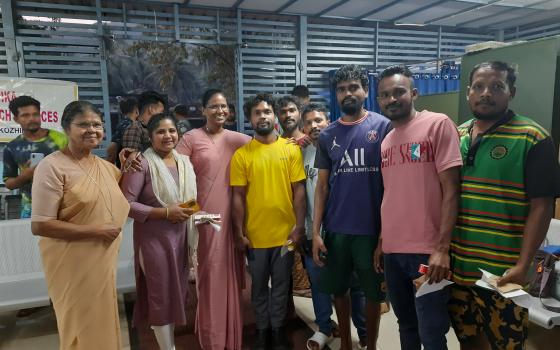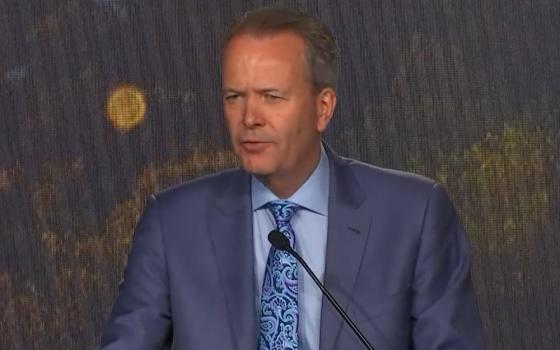
Dennis Apel is arrested at Vandenberg Air Force Base (Photo courtesy Mike Wisnieski/LACW)
John Dennis Apel and Tensie Hernandez-Apel are taking their children with them to the Supreme Court on Wednesday morning. Their monthly protests for 17 years outside of Vandenberg Air Force Base, Calif., led them to this -- United States of America, Petitioner v. John Dennis Apel -- a case that could shape First Amendment rights for activists across the country.
In his brief to the Supreme Court, Donald Verrelli, the U.S. solicitor general, writes that allowing Apel to continue protesting outside of Vandenberg sets a precedent that "threatens substantial harm to the safe and orderly operation of many of this Nation's military installations."
Seventeen years ago, the Apels founded the Beatitude Catholic Worker House in Guadalupe, Calif., about 30 minutes away from the base. Vandenberg tests intercontinental ballistic missiles while "ground-based radar, [a] Space-Based Infrared System and Defense Support Program satellites monitor ballistic missile launches around the world to guard against a surprise missile attack on North America," according to its website.
Even though California Highways 1 and 246 weave through Vandenberg's restricted property, they are open for public use due to an easement granted to the state of California and the county of Santa Barbara. The Apels have been holding a monthly peace vigil near the entrance to Vandenberg Air Force Base since 1996, asking protesters to stand on the public side of Highway 1 in an area the military marked with a painted green line.
"In 1989 ... the commander set up a public protest area just outside the main gate, along U.S. 1," wrote Lyle Denniston on SCOTUSblog.com, which covers the Supreme Court. "The protest zone that the base commander authorized is entirely within the space covered by the easement."
However, in 2007, the military banned Apel from the Vandenberg property for life and in 2010 added the protest zone to the ban. In matters of national security, the military said, the highway is under military jurisdiction.
"It's always been, if you cross the green line, you get arrested and charged with trespassing. If you don't cross the green line, you don't get arrested," Apel told NCR on Tuesday.
Apel threw his own blood onto Vanderberg's entrance sign in 2003, then crossed the green line in civil disobedience. Even though the military cited and barred him from entering the base for three years, he continued to vigil monthly behind the green line and organize larger protests. He was not arrested.
Although Apel was barred from the base for life after crossing the line in 2007, Apel continued to vigil in the protest zone and was not questioned for doing so.
Something changed in 2010, when the military assigned a new base commander.
"My sense is that [the commander] decided, 'This guy is ban and barred -- why are we letting him protest outside our base?' " Apel said.
The military started to arrest Apel at every monthly peace vigil for 15 consecutive months, though he never left the protest zone.
"They tried different things to make it more a little more uncomfortable during those 15 months," Apel said. At one point, Apel said the military arrested him and left him in the county jail for five and a half hours without explanation.
"Eventually, I think they decided that I wasn't going to stop protesting and so they took it to court," he said.
Apel appeared before a magistrate judge to face charges of his last three Vandenberg arrests. Apel "thought it was great" because U.S. citizens have a legal right to protest peacefully on a public roadway. Thinking he would win the case, Apel said he decided to represent himself.
"To my surprise and dismay, the judge ruled in their favor," Apel said.
Apel appealed with the help of a friend to a federal court, but the judge upheld the prior conviction. Apel said he realized he was in over his head, so he petitioned for a pro bono lawyer. Erwin Chemerinsky, dean of the University of California, Irvine law school and constitutional lawyer, agreed to take Apel's case to the U.S. Court of Appeals for the Ninth Circuit.
The Ninth Circuit reversed Apel's convictions, citing a similar case, Parker v. United States: "Parker held that because a stretch of highway running through Vandenberg AFB is subject to an easement ... the federal government lacks the exclusive right of possession of the area on which the trespass allegedly occurred."
Verrelli petitioned the Supreme Court, arguing that the Ninth Circuit decision "will impair the ability of base commanders in [the Ninth Circuit] area to enforce the federal no-reentry law," and "base commanders would be forced to make a choice between limiting or cutting off civilian use of those roadways, or continuing to allow demonstrators to encroach on base property, posing risks to base security," according to SCOTUSblog's Denniston.
Chemerinsky will argue for Apel, focusing on the First Amendment right to free speech. It's a right Apel said he wants not just for himself or for his family.
"I would like people to understand that it's not about me. It's about everybody," Apel said. "It is about everybody's right to express their point of view."
[Megan Fincher is an NCR Bertelsen intern. Her email address is mfincher@ncronline.org.]



